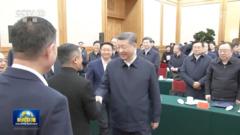Amidst a meeting this week between Chinese President Xi Jinping and leading business figures, the return of Alibaba founder Jack Ma has ignited significant speculation and excitement. Once the face of China's booming tech sector, Ma had retreated from public life after his critical remarks about the country's financial landscape in 2020. His visibility at this high-profile event has led analysts to ponder potential shifts in China’s economic strategy and regulatory environment.
The response in the stock market has been positive, with shares of Alibaba soaring over 60% this year, boosted by the company’s latest financial report, which exceeded expectations. Observers note Ma's prominent seating and handshake with Xi as indicators of his restored status within the Chinese business community. Social media buzzed with congratulatory sentiments, suggesting that his return could invigorate the economy as a whole.
Concerns linger, however, as Ma did not take the stage to speak, indicating that while he may be rehabilitated, he has not regained his former prominence. His previous fall from grace—following his critique of state banks—was part of a broader crackdown on the tech industry, which saw strict regulations limiting the power of leading private enterprises.
Xi's recent comments at the symposium—encouraging innovation during challenging times—have been interpreted as a sign that Beijing may be loosening its grip on the tech sector, though analysts caution against assuming an end to scrutiny. Companies from various sectors including Huawei and BYD were represented at the event, highlighting the government's recognition of tech’s critical role in future growth.
The potential for a renewed focus on private enterprise is underlined by the recent rise of DeepSeek’s AI chatbot, a success that has boosted national pride and financial markets amidst ongoing US sanctions against China's tech advancements. Experts believe this spectacular success could mark a pivotal shift toward innovation and economic revitalization.
As Xi’s administration emphasizes "high-quality development," analysts suggest that a measured cooperation with the private sector could be beneficial for achieving industrial goals. The overall sentiment appears to reflect a transition from strict crackdowns towards fostering a more balanced relationship with China's entrepreneurs, with emphasis on aligning with state objectives rather than unrestricted growth.
The response in the stock market has been positive, with shares of Alibaba soaring over 60% this year, boosted by the company’s latest financial report, which exceeded expectations. Observers note Ma's prominent seating and handshake with Xi as indicators of his restored status within the Chinese business community. Social media buzzed with congratulatory sentiments, suggesting that his return could invigorate the economy as a whole.
Concerns linger, however, as Ma did not take the stage to speak, indicating that while he may be rehabilitated, he has not regained his former prominence. His previous fall from grace—following his critique of state banks—was part of a broader crackdown on the tech industry, which saw strict regulations limiting the power of leading private enterprises.
Xi's recent comments at the symposium—encouraging innovation during challenging times—have been interpreted as a sign that Beijing may be loosening its grip on the tech sector, though analysts caution against assuming an end to scrutiny. Companies from various sectors including Huawei and BYD were represented at the event, highlighting the government's recognition of tech’s critical role in future growth.
The potential for a renewed focus on private enterprise is underlined by the recent rise of DeepSeek’s AI chatbot, a success that has boosted national pride and financial markets amidst ongoing US sanctions against China's tech advancements. Experts believe this spectacular success could mark a pivotal shift toward innovation and economic revitalization.
As Xi’s administration emphasizes "high-quality development," analysts suggest that a measured cooperation with the private sector could be beneficial for achieving industrial goals. The overall sentiment appears to reflect a transition from strict crackdowns towards fostering a more balanced relationship with China's entrepreneurs, with emphasis on aligning with state objectives rather than unrestricted growth.




















